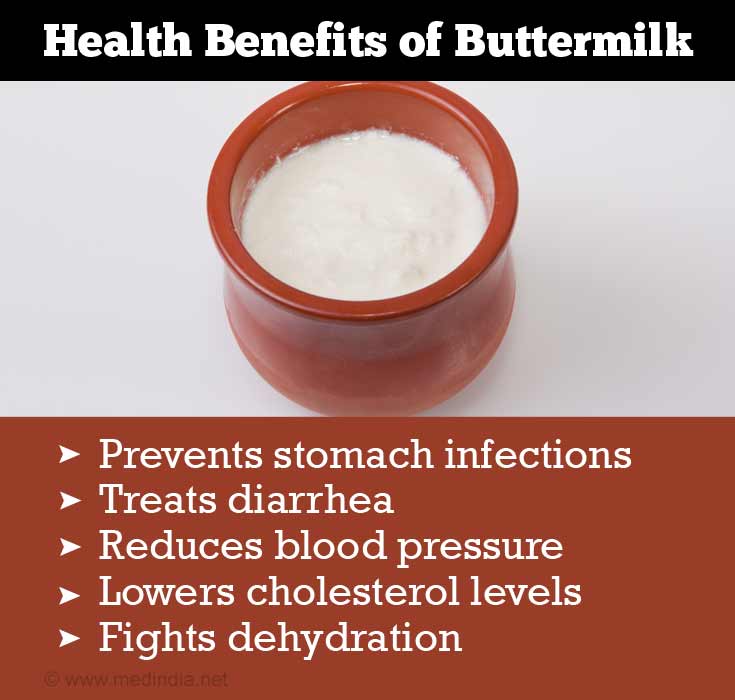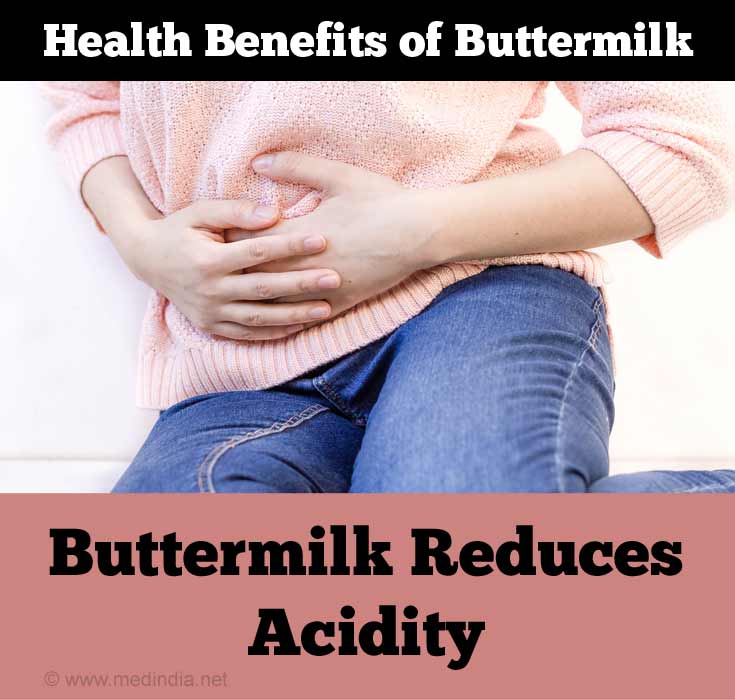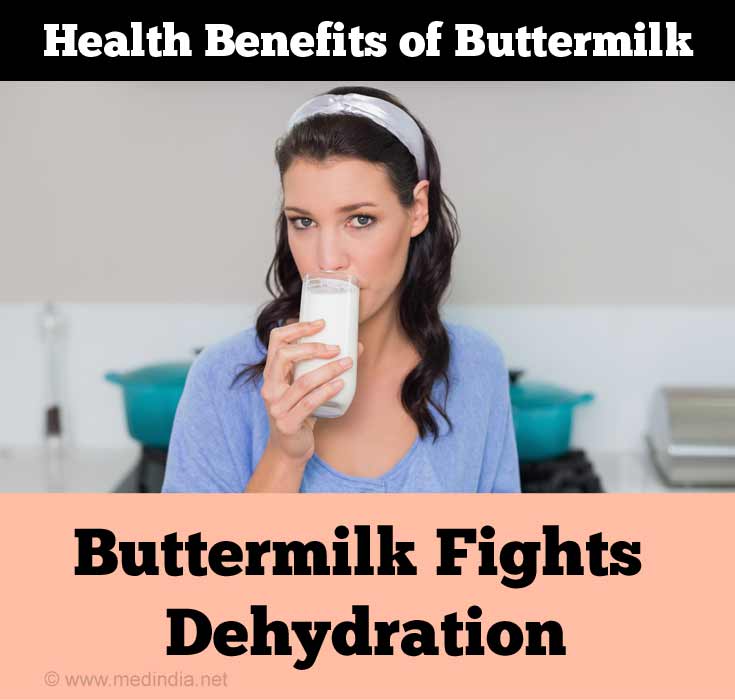- Effect of buttermilk consumption on blood pressure in moderately hypercholesterolemic men and women. - (http://www.ncbi.nlm.nih.gov/pubmed/24206823)
- Yogurt and gut function - (https://academic.oup.com/ajcn/article/80/2/245/4690304)
What is Buttermilk?
Originally, the term buttermilk referred to the liquid that was left over after churning butter from cream, but today the word is used to describe a type of fermented dairy drink that is common in many countries with warm climates.
To make a clear distinction between the two types of buttermilk, the leftover liquid when producing butter is sometimes called traditional buttermilk while the fermented milk drink is called cultured buttermilk. Cultured buttermilk is sour as it contains probiotic bacteria that convert the lactose sugar in milk into lactic acid. This is why the calories in buttermilk are less than the calories in milk. For those on a weight-loss diet plan, low-fat buttermilk would be the best option.

Health Benefits of Buttermilk
Buttermilk is especially popular during summer as a tall glass of chilled buttermilk is refreshing and invigorating and is the perfect antidote to the scorching sun! Here are a few of the many health benefits of buttermilk:
- Digestive Aid: Buttermilk contains probiotic microbes which promote digestion, and has a positive impact on the immune system. These healthy microbes also prevent the proliferation of unhealthy bacteria which is why buttermilk can treat and even prevent stomach infections and diarrhea. Furthermore, buttermilk often contains ginger and jeera (cumin) which soothe the digestive system and prevent indigestion and excessive gas.
- Acidity: Thanks to our high-fat and spicy diets, acidity has become a common problem. While logic would dictate that we change our eating habits to curtail the problem, we are reluctant to give up our favorite foods and so we turn to antacids and other medications. While it is natural to want to have your cake and eat it too (quite literally!), you will need to compromise on your portion size and have a large glass of buttermilk just after your treat. Buttermilk neutralizes excessive stomach acids and it also contains lactic acid which helps to control the formation of gastric acid. Earlier it was thought that a glass of warm milk would help to prevent acidity but several tests showed that although milk can provide immediate relief from acidity, the effect is only temporary. Consuming milk causes an increase in gastric acid production for a minimum of three hours and so it is best to substitute your daily glass of milk with a glass of buttermilk.

- Reduces Blood Pressure: In a recent study published in the Journal of Nutrition, scientists found that consuming buttermilk on a daily basis can lower blood pressure in individuals with slightly or moderately high blood pressure. This effect is due to the presence of a unique protein in buttermilk that also lowers cholesterol levels.
- Suitable for Lactose Intolerant People: People who are lactose intolerant often have trouble meeting their daily calcium requirements as they cannot consume most dairy products. The microbes in buttermilk turn the lactose sugar in milk into lactic acid and so people who are lactose intolerant can have buttermilk. Individuals with severe intolerance, however, might have trouble even with the small amounts of lactose present in buttermilk so it would be wise to first consume just a small amount of buttermilk.
- Fights Dehydration: Buttermilk contains salt, assorted electrolytes and water which makes it the perfect way to stave off dehydration. If you need to run errands and have to brave the mid-day sun, carry a bottle of cold buttermilk with you so that you can chug it down whenever the heat starts to get to you.

Buttermilk Recipe
Homemade buttermilk is easy to make and requires very little preparation time. You can set your own yogurt or use non-flavored yogurt to make buttermilk at home.
Ingredients:
- 2 cups of yogurt
- 1½ cups of ice-cold water
- 1 tsp roasted and ground cumin seeds (jeera)
- Fresh coriander leaves
- Fresh mint leaves
- Freshly ground pepper powder
- Rock salt (black salt)
Method:
Place the yogurt, water, cumin seed powder, salt and pepper in a large mixer bowl and blend it for about 30 seconds to a minute. Pour the buttermilk into large glasses and garnish with chopped coriander and mint leaves. If you prefer not to use a garnish, you can blend the coriander and mint leaves along with the rest of the ingredients.
Buttermilk Health and Beauty Tips
- Sunburn: In a mixer bowl, blend half a cup of cold buttermilk along with half a tomato and a handful of mint leaves. Apply this liquid to your skin to help soothe your sunburn and accelerate the healing process.
- Cleanser: Buttermilk can be used to cleanse and nourish your skin. Mix equal amounts of buttermilk and rose water and add a drop of almond oil to the mixture. Soak a cotton pad in this liquid and gently scrub your face clean of dirt and grime. Wait for at least an hour and then rinse your face with cold water. Do this on a regular basis for optimum buttermilk skin benefits.
- Hair Mask: Blend a banana and one cup of buttermilk and apply this liquid to your hair and scalp. Leave it on for at least an hour and then wash it off with cold water. This hair mask is perfect for those with frizzy hair and it will leave your hair soft and free of knots.
- Diabetes: Two studies showed that aloe gel can reduce blood sugar levels in women with type 2 diabetes. Mix equal amounts of buttermilk and Aloe juice and drink this every morning if you have diabetes.
- Cholesterol: A mixture made up of 20 ml of Aloe gel and 30 ml of buttermilk can help reduce cholesterol levels as long as it is consumed regularly.






